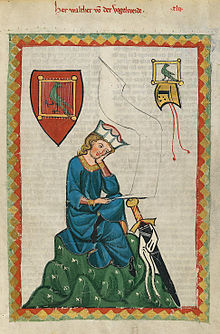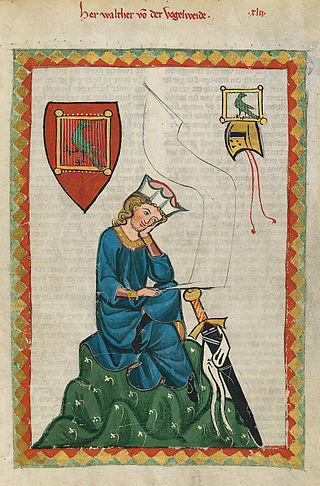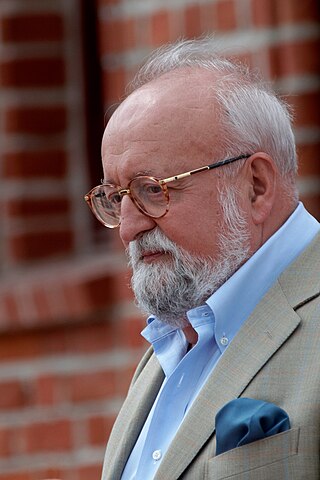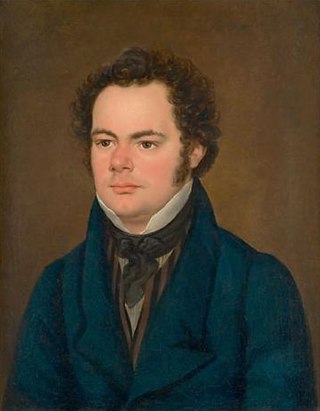
"Elegie" is a poem written by the German lyric poet Walther von der Vogelweide. It is written in Middle High German and is a lament to the passage of the years. [1]

"Elegie" is a poem written by the German lyric poet Walther von der Vogelweide. It is written in Middle High German and is a lament to the passage of the years. [1]
Full poem:

Walther von der Vogelweide was a Minnesänger who composed and performed love-songs and political songs ("Sprüche") in Middle High German. Walther has been described as the greatest German lyrical poet before Goethe; his hundred or so love-songs are widely regarded as the pinnacle of Minnesang, the medieval German love lyric, and his innovations breathed new life into the tradition of courtly love. He was also the first political poet to write in German, with a considerable body of encomium, satire, invective, and moralising.

Reinhard Friedrich Michael Mey is a German Liedermacher. In France he is known as Frédérik Mey.

"Die Gedanken sind frei" is a German song about freedom of thought. The original lyricist and the composer are unknown, though the most popular version was rendered by Hoffmann von Fallersleben in 1842.
Paul Godwin (1902–1982) was a violinist and the leader of a popular German dance orchestra in the 1920s and 30s.

Ireen Sheer is a German-English singer. She had a top five hit on the German singles chart with "Goodbye Mama" in 1973. She went on to finish fourth at the Eurovision Song Contest 1974 representing Luxembourg, sixth at the Eurovision Song Contest 1978 representing Germany, and thirteenth at the Eurovision Song Contest 1985 representing Luxembourg again.

"Vater Unser, Part II " is the eighth single released by the German music project E Nomine, and appears on the 2004 album Das Beste aus... Gottes Beitrag und Teufels Werk. This tracks is a mix of 'Vater Unser' and 'Psalm 23' from "Das Testament" (1999).

"Prometheus" is a poem by Johann Wolfgang von Goethe, in which the character of the mythic Prometheus addresses God in misotheist accusation and defiance. The poem was written between 1772 and 1774 and first published in 1789 after an anonymous and unauthorised publication in 1785 by Friedrich Heinrich Jacobi. It is an important work of the Sturm und Drang movement.

The Symphony No. 8 "Lieder der Vergänglichkeit" by Krzysztof Penderecki is a choral symphony in twelve relatively short movements set to 19th and early 20th-century German poems. The work was completed and premiered in 2005. The symphony has an approximate duration of 35 minutes. Penderecki revised the symphony in 2007 by adding a few more poem settings and the piece has expanded to around 50 minutes. Although given the designation Symphony No. 8, it was not actually the final symphony Penderecki completed before his death in March 2020; the Sixth Symphony, begun in 2008, was not completed until 2017.

Paola del Medico Felix is a Swiss singer.

Wernher von Homberg was a knight in the service Emperor Henry VII, and later of Frederick the Fair. His Minnesang poems are recorded in the Codex Manesse.
The 66 Chorale improvisations for organ, Op. 65, were composed by Sigfrid Karg-Elert between 1906 and 1908, and first published in six volumes in 1909. The composition was dedicated to "the great organist Alexandre Guilmant".
Franz Schubert's best-known music for the theatre is his incidental music for Rosamunde. Less successful were his many opera and Singspiel projects. On the other hand, some of his most popular Lieder, like "Gretchen am Spinnrade," were based on texts written for the theatre.

Franz Schubert's best known song cycles, like Die schöne Müllerin and Winterreise are based on separate poems with a common theme and narrative. Other song cycles are based on consecutive excerpts of the same literary work: Schubert's "Ave Maria" is part of such a song cycle based on excerpts of the same poem, in this case by Walter Scott.
"Straf mich nicht in deinem Zorn" is a Lutheran hymn with a text written by Johann Georg Albinus as a paraphrase of Psalm 6. It was first printed with a formerly secular melody in Dresden in 1694. The song was included in 31 hymnals. The melody inspired musical settings both for organ and vocal works. The hymn was translated by Catherine Winkworth as "Not in anger, Mighty God", which appeared in 13 hymnals.
The Botho-Lucas-Chor was one of the most famous German vocal ensembles of the 1960s and 1970s.

Uta Bresan is a German schlager / folk singer and television presenter. Commentators pay tribute to her enduring versatility in both capacities.